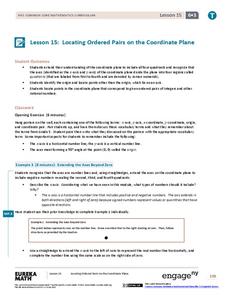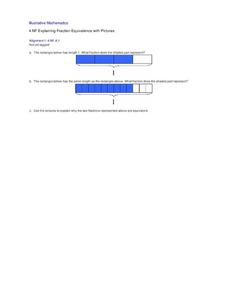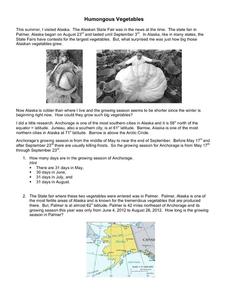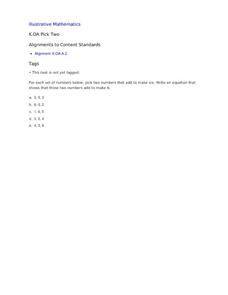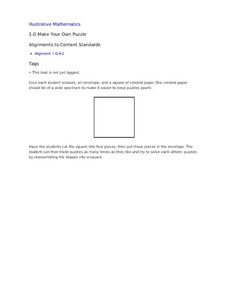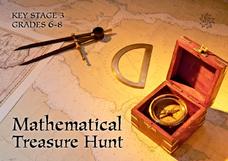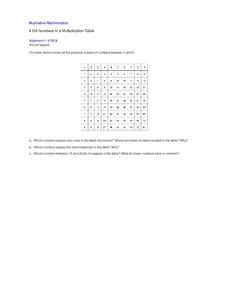EngageNY
Linear Functions and Proportionality
Connect linear equations, proportionality, and constant rates of change to linear functions. Young mathematicians learn how linear equations of the form y = mx + b can represent linear functions. They then explore examples of linear...
EngageNY
Scientific Notation
Young mathematicians learn how scientific notation is meant to save time. Part 10, out of a series of 15, asks scholars to recognize the correct use of scientific notation and finish by adding and subtracting numbers using the notation.
EngageNY
Locating Ordered Pairs on the Coordinate Plane
Four quadrants, four times the fun. Future mathematicians learn the terminology associated with the coordinate plane and how to plot points in all four quadrants. A worksheet tests their understanding of the material in the 16th...
EngageNY
Writing and Evaluating Expressions—Exponents
Bring your young mathematicians into the fold. Scholars conduct an activity folding paper to see the relationship between the number of folds and the number of resulting layers in the 23rd installment of a 36-part module. The results of...
Bowland
You Reckon?
Sometimes simple is just better. A set of activities teaches young mathematicians about using plausible estimation to solve problems. They break problems down to simpler problems, use rounding and estimation strategies, and consider...
CK-12 Foundation
Converse, Inverse, and Contrapositive
Logically speaking, here is a great resource. Young mathematicians apply an interactive to consider the converse, inverse and contrapositive statements. Eight challenge questions assess understanding of the material.
Illustrative Mathematics
Representing Half of a Circle
Geometric shapes make great visual models for introducing young mathematicians to the concept of fractions. Looking at a series of four circles, students are asked to determine whether or not one half of each circle is shaded. To support...
Illustrative Mathematics
Heads or Tails
Heads! A great way to practice probability is to flip a coin in class. The provided data allows your mathematicians to predict the probability of heads in ten coin flips. Bring coins to class and allow your own trial of heads or tails....
Illustrative Mathematics
Explaining Fraction Equivalence with Picture
Visual models are a great tool for demonstrating the concept of equivalent fractions. Given two pictures, young mathematicians first identify each fraction and then write an explanation for why they are equivalent. Use as a guided...
Curated OER
Number Sequences
Number sequences make for great challenges that stimulate pattern recognition, algebraic reasoning, and number sense. This slide-show includes eleven number sequences for learners to work through, an explanation of what number sequences...
Curated OER
Humongous Vegetables
Humongous vegetables can inspire and awaken your mathematicians to the large math concepts in our Common Core standards. What is the secret to growing such gargantuan garden objects in Alaska? In the state that is closest to the North...
Illustrative Mathematics
The Escalator, Assessment Variation
A great way to practice with unit rates, the activity gives your mathematicians an opportunity to compare different statements and select which are true. They can practice with "choose all that apply" by setting each statement into its...
Illustrative Mathematics
Stained Glass
A complex question looking for the total cost of a stained glass window by calculating area and circumference of a circle. With detailed components, this activity will challenge your designers to figure out if they have enough money to...
Curated OER
Find 2/3
This short problem with representing fractions on a number line is more than meets the eye. Labeled only with the numbers zero and 1/4, a number line is used to locate the fraction 2/3. A solution can be found in multiple ways, but young...
Curated OER
Rolling Twice
Rolling dice is the best way to show your learners how probability comes in to play. Although this lesson does not specify an activity, your mathematicians can try this probability with real dice to calculate their experimental...
Illustrative Mathematics
Pick Two
Learning to break apart numbers into smaller pairs is a critical step young mathematicians take as they develop their number sense. To practice this skill, children are provided with sets of three numbers and are asked to pick the two...
Illustrative Mathematics
Make Your Own Puzzle
Puzzling over what geometry lesson to teach next? Look no further. This simple activity teaches young mathematicians how shapes can be decomposed into smaller figures, and how smaller figures can be assembled into larger shapes. To learn...
Curated OER
Mathematical Treasure Hunt
The hunt is on! Young mathematicians follow clues and complete a series of ten math puzzles as they try to crack Dr. Integer's code and find the location of his hidden treasure.
Public Schools of North Carolina
Math Stars: A Problem-Solving Newsletter Grade 4
Fresh off the press, these math newsletters will challenge the problem solving skills of your young mathematicians. With an incredibly wide variety of questions covering the topics of arithmetic and geometry, these unique...
Curated OER
Multiples
A great worksheet for scaffolding critical thinking about mathematical concepts. This resource provides students with a brief explanation of multiples followed by 29 practice problems which gradually increase in difficulty. Several...
Curated OER
Counting Rabbits
You've heard of counting sheep, but what about counting rabbits? This is a fun way to approach data analysis with young mathematicians. Examining a chart, they see how many times James and his family saw rabbits in their yard over a...
Illustrative Mathematics
Numbers in a Multiplication Table
Identifying patterns is a crucial skill for all mathematicians, young and old. Explore the multiplication table with your class, using patterns and symmetry to teach about square numbers, prime numbers, and the commutative and identity...
Scholastic
Study Jams! Prime & Composite Numbers
Prime or composite, that is the question. Teach your class how to find the answer with this step-by-step presentation that defines and provides examples of each type of number. When addressing larger numbers, divisibility rules are...
Have Fun Teaching
Base 10 Blocks
Base ten blocks are a great tool for teaching young mathematicians about a number of math concepts, unfortunately they aren't always available to teachers. That is, until now. This printable resource allows all children the opportunity...




